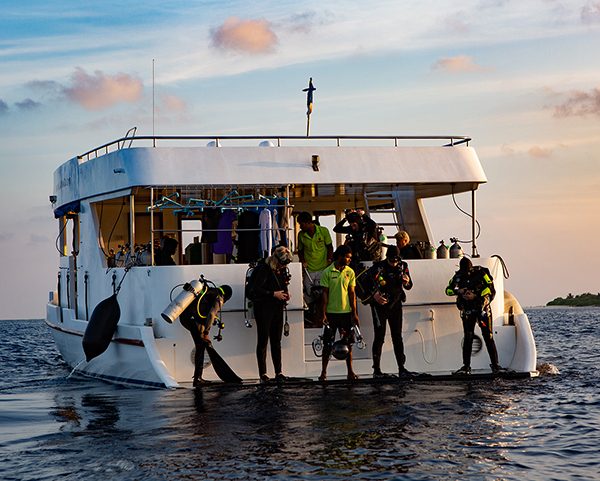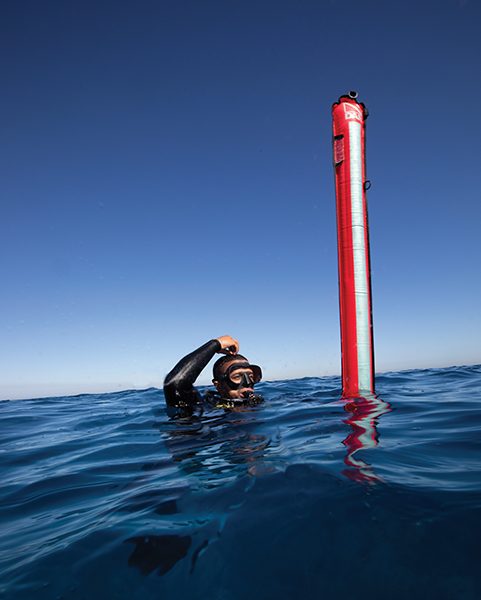DIVE CUSTOMER HEALTH
AND SAFETY–DIVE TRIPS

DEPTH, TEMPERATURE, CURRENTS, bottom topography, marine life, visibility, and more determine the risks that a certain dive site will pose …
MANAGE EXPECTATIONS
Customers may have incorrect or unrealistic expectations of your dive operation, and this could potentially lead to illness or injury of the customer or staff member. It could even lead to legal action. For these reasons, a thorough briefing of services offered should be given before the beginning of the trip — and perhaps even before customers book their dives.
This briefing will be dependent on the diver’s goals and could include issues such as the scope of training courses, conditions of service, prerequisite qualifications, equipment or insurance requirements, local environmental requirements (such as prohibition of the use of gloves or dive knives), and costs.
FITNESS TO DIVE
It is possible that your request for more information from a customer might be interpreted as invasive or discriminatory. However, this is important information that you need in order to keep everyone involved safe. It’s necessary to make sure customers are diving within the scope of their training, are physically and medically fit to dive, and are not being exposed to undue risk.
Operators should put policies in place that are designed to provide consistent, systematic screening of customers, especially if they are expected to engage in higher-risk activities such as technical or deep diving or diving in a remote location. This screening should include proof of certification, the date of the customer’s last dive, language comprehension, age, experience level, and comfort in the water. Additionally, a fitness-to-dive questionnaire or questions relating to preexisting medical conditions should be required. This should include some assessment of the diver’s physical abilities before they enter the water.

RIGHT OF REFUSAL
Many dive operators are hesitant to decline service in the event of potential concerns if those concerns are unrelated to medical issues or certification. However, dive operators have the right to refuse service if their decision is based on sound, consistent and safety-related reasons.
If a client will expose you, your staff, or other customers to risks that can’t be suitably mitigated, you should consider declining to take them diving. This decision can be made at any stage, whether they are inquiring about registering or sitting on the boat on the way to the dive site. Some reasons you may want to consider denying service to a customer include inability to perform basic functions, appearing to be under the influence of drugs or alcohol, being medically unfit to dive, exhibiting behavior such as aggression or not following instructions, or having equipment that is clearly damaged or unsuitable for the dive.
A clear and concise policy should be communicated to customers via your website, a sign posted in your shop, and/or an email sent to customers when they register to dive. Canceling a dive or refusing service should always be consistent with your stated policy and based on safety considerations.

DIVE SITE
RISK ASSESSMENT
Some dives are easy, while others are demanding or technically challenging. Depth, temperature, currents, bottom topography, marine life, visibility, and more determine the risks that a certain dive site will pose to your customers and staff. Remember it is almost impossible to identify every single hazard, and customers will always be exposed to some level of risk. Mitigation of these risks is therefore imperative.
Establish a policy requiring a formal risk assessment, and set site-specific requirements regarding certification, experience, and fitness for divers who will be diving there. Sea and water conditions, entry and exit considerations, environmental risks, and adequate gear are just a few of the things you should consider during site assessments.
DAN Customer Service
Mon–Fri, 8:30 a.m. – 5 p.m. ET
+1 (919) 684-2948
+1 (800) 446-2671
Fax: +1 (919) 490-6630
24/7 Emergency Hotline
In event of a dive accident or injury, call local EMS first, then call DAN.
24/7 Emergency Hotline:
+1 (919) 684-9111
(Collect calls accepted)
DAN must arrange transportation for covered emergency medical evacuation fees to be paid.
Medical Information Line
Get answers to your nonemergency health and diving questions.
Mon–Fri, 8:30 a.m. – 5 p.m. ET
+1 (919) 684-2948, Option 4
Online: Ask A Medic
(Allow 24-48 hours for a response.)
